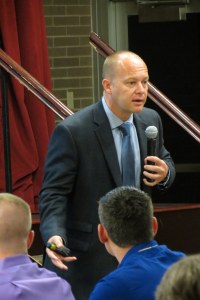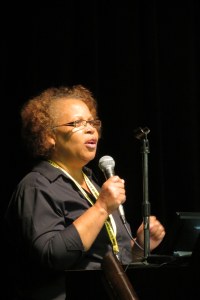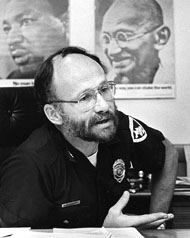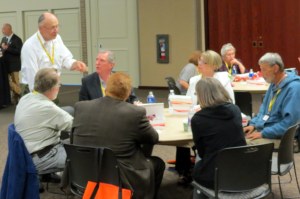
“Strengthening Community Trust in Kansas City” Capt. Charles “Chip” Huth, Kansas City PD: SWAT team commander, Adjunct Professor for University of Missouri and part-time instructor at the Police Leadership Academy. Coauthor of “Unleashing the Power of Unconditional Respect and Transforming Law Enforcement and Police Training” (See http://www.amazon.com/Unleashing-Power-Unconditional-Respect-Transforming/dp/1420099744) For even more see: http://unleashingrespectproject.org
Also see his TED talk on the subject at: https://www.youtube.com/watch?v=4_29TS6jjsA
“Ideas that helped the SWAT team he led (60 members) transform from the most complained about team to a 3 fold increase in productivity by all classical measures while at same time reducing community complaints in 6 yrs. to ZERO!
“The policing profession: Integrity and courage expressed as unconditional respect for others
“(Stated twice that he has lost two marriages and a lot more in his life until he really learned and integrated these principles into his life.)
“Anima: protection; nearest level to our heart; referring to how we are. (See https://en.wikipedia.org/wiki/Anima_and_animus)
“The something that is deeper than behavior. Leadership and Self-Deception: Getting Out of the Box (http://www.amazon.com/Leadership-Self-Deception-Getting-Out-Box/dp/1576759776 . This work from the Arbinger Institute (www.Arbinger.com )was life changing for him.
“As it turns out, isn’t true that who you are just stays inside and can be separate from what you do; who you are leaks out in everything you do; way of being; level deeper than behavior
“Insincerity can weaponize a compliment.
“He learned this from the street; someone on the street. This is why cops get shot. A homeless person was talking to Chip and told him that this one particular cop should be fired. Chip was surprised because he had seen the interaction between the person and the officer. He asked, ‘What did the cop say?’
“The man said, ‘Wasn’t anything he said; he’s the worst among you.’ Chip said. ‘Well, then, what did he DO?’ ‘I’m just telling you this guy’s gotta go.’ Chip responded, ‘If he didn’t say or do anything wrong then he’s doing everything right,’ Homeless guy, ‘Ya, but you can do right in the wrong way.’
“Got him to thinking about mindset.
“Integrity. For lots of folks it means honesty, but honesty not always best and integrity is deeper than honesty. High core value; sometimes we think we’re engaged in substantive argument when we are in word games; this limits our ability to communicate.
“Discerning right from wrong depends on my biases, fears, prejudices, loyalties etc.
“Does anyone in here feel you’re bias free? Lots of programs designed to get rid of these; but we need some of those biases; otherwise would be danger to ourselves and others; sometimes cloud our ability to see the right thing.
“Integrity means we can see what is right. If we improve the quality of our thinking we will naturally improve the quality of what we offer to people
“Courage and bravery: we have very bravery-rich (running into burning building to save someone; when others agree with your acts). Bravery is a high cultural value — but it does not value courage (acting with great social risk even if your group doesn’t agree). With police it is very difficult to find courageous acts. We are awful talking to each other but not about each other. Most of the lack of courage flows from leadership; we see things that must change but lack courage to change them. Almost for sure you’ll get pushback when you attempt to change that which must change. (Two things police hate: the way things are, and change.)
“By changing our systems we allow for more accountability; that is, integrity is a team responsibility.
“Can’t possibly get rid of our biases; must make compensations for our tendencies Courage is resistance to fear; mastery of fear; not absence of fear. Opposite of courage is indifference.
“Example of plate glass window. Would you go thru plate glass window, for $50? How about if someone was trapped behind that glass; someone you deeply cared about? Of course, we’d go through that window to save a loved one.
“Teaching and requiring respect. First pushback, ‘Well, they don’t have it for me so I don’t have respect for them.’ It becomes like an agreement that keeps the cycle of disrespect flowing.
“Respect is not trust; trusting everybody is eventually a death sentence. Respect is having regard for the basic dignity of every individual. People we’re serving have hopes, needs, fears and dreams just like you and I do; that’s what makes them people. There is power in being able to understand behavior without condoning it.
“If I had grown up in inner city in Kansas City, if I had to sleep on floor to avoid bullet, if I never got my school money to school, etc., etc. etc. would it be okay to join a gang for protection? You bet it would.
“Video of Officer Elton Simons, a LA Sheriff’s Department motorcycle traffic cop. There are endless commendations in his record and NO complaints; unheard of for an officer who had NO complaints; his administration couldn’t understand this; video shown of his behaviors toward people he ticketed, and the people who got ticketed; incredibly respectful while doing this and people being ticketed almost in awe of him when interviewed. Situation changes if you give a different cop to work with. (See https://www.youtube.com/watch?v=9W6FEW3dAgo)
“Have to be careful not only how we intend — but how it’s understood. How NOT to teach, as taught in military. Warrior ethos saved my life; can go for days on that ethos; even when relevant, extremely misunderstood; now has become much worse than that. If you want to think about how helpful a warrior ethos is, try going to war; that makes you aspire to be just that.
“Warrior ethos turned inward is very powerful; but not turned outward toward the public; people have a right to have a voice in how we behave e.g. community rose up and said NO to chasing stolen cars once a pedestrian was killed in a car chase; they decided not worth someone getting killed; don’t chase rose up from community; so, we don’t do that anymore
“Strategic advantages of unconditional respect…more effective pre-contact threat assessment
“What happens? When the humanity of others lowers our danger flag; e.g. Nicole Cotton approaches a homeless man twice her size; thinks he’s wanted for aggravated rape; gets out of the car but disregards her backup; he beats her so badly, stripping her and then emptying her gun of all bullets; killed her right on the street. She had trust simply because he was homeless, disregarded her backup; did nothing technically wrong — she just felt no threat from the homeless subject because he was homeless; implied message it doesn’t matter if you’re twice my size; if you’re homeless you’re not a threat
“Ability to recognize subtle precursors to violent behavior. Things that leak out when someone’s going to do bad; listening with intent to respond; as it turns out we can be blind to this when we objectify others; written about a lot in psych sciences; we can’t realize the dangers.
“Closing the Hesitation gap. People get so mad about police officers; the main reason it happens is the law is very broad standard. Remember, cops get it right most of the time; for every one instance wrong, there are thousands that go right.
“One of the biggest problems is that we hesitate to use enough force in about 85% of the time. Circumstances; unprepared, unsure, ‘Ferguson effect’; critically important to be physically competent.
“Most women in law enforcement uniquely equipped to do this job. If you’re going to judge total efficacy by 1-2% of what they do, you will say this is not true, but if you look at rest of it, interpersonal, emotional intelligence that make interactions impactful and effective, they are the best.
“You can’t not communicate contempt and disrespect; therefore there are strategic advantages of unconditional respect.
“A man and a woman can be engaged in conversation and it seems to be going fine, then one blows up. This has been studied with slow-motion videos and it turns out there are cues that show up that the other person misses prior to the blowup.
“If you’re in position of authority, people with you have signal detectors that fire up to enhance their ability to sense this. By listening, able to be influenced by the content of the message; listen with intent to understand, not respond.”

Response: Dr. Rosalyn Broussard: Batchelor’s Degree in Social Work, PhD in Political Science; taught in Social Sciences Dept. at UW-Platteville for 20 years, is Interim Chair of Interdisciplinary Studies and the Director of Ethnic Studies. Also serves on the City of Platteville Police and Fire Commission.
“Building relationship between police and the black community. No respect occurs without trust and you must have truth. Leads us to put people out there as scapegoats. Allows us to disregard black people in community.
“Look at narrative about black and brown males; ‘Birth of a Nation’ movie; shown at the White House at the time and they thought it was right on; everybody getting this lesson so therefore when police respond to certain issues, mindset is…this group needs to be controlled so the response is going to be the problem.
“Example, Hurricane Katrina, gunshots in the community were very likely often misinterpreted; much of this perpetuated by the media; very likely many were signaling where they were and that they needed help.
“Young cops are especially vulnerable to old beliefs.
“What will we need to do to change these problems in this country? We have to ask what is driving the anger in the black community? What is the role of government in destroying the black family and the black community? What is role of government when we think of drugs, lack of education, jobs, opportunity in black community? Why is there black crime?
“A well defined problem is a half-solved problem.
Questions & Answers
Chip: Told by one of his ex-wives when he was trying to talk her into staying, ‘You can’t talk your way out of a situation you behaved your way into.’ Some officers have quantum ability to influence public in the wrong way



THIS IS SO GOOD! Thank you, David.
LikeLike
The former KS poiice commander did not give more information on what the homeless guy was trying to tell him about getting rid of the cop.
“Told by one of his ex-wives when he was trying to talk her into staying, ‘You can’t talk your way out of a situation you behaved your way into.’ Some officers have quantum ability to influence public in the wrong way.”
That remark by the cop and his ex-wife should be on every police station and every police academy’s bulletin board. And cops wonder why they lose their jobs plus get injured on the job. Too many of them don’t think first before they open their mouth let alone shut their mouths.
Good stuff so far on this series.
LikeLike
“Courage and bravery: we have very bravery-rich (running into burning building to save someone; when others agree with your acts). Bravery is a high cultural value — but it does not value courage (acting with great social risk even if your group doesn’t agree).
Cops don’t have courage when it comes to standing up to wealthy people and corporations.
LikeLike